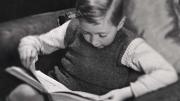Adams University professor emeritus Bernard Bailyn, Ph.D. ’53, LL.D. ’99, remains a giant among early-American historians, and among the ranks of Harvard University citizens. Illuminating History: A Retrospective of Seven Decades (W.W. Norton, $28.95) contains five of his razor-sharp portraits of “small, strange, obscure, but illuminating documents or individuals,” extending from each “datum” to “its meaning for the world at large.” Harvardians may value even more having the texts of his Memorial Minutes for fellow giants Samuel Eliot Morison and Oscar Handlin (see The College Pump, page 64). Historians will value his epilogue on his scholarship, “The Elusive Past.” All readers will cherish the unusually warm, personal introduction, “Entering the Past,” from which this excerpt comes—explaining an education that “began in an addiction I had somehow acquired to reading.”
My parents were complicit in this addiction, and they had an expert to advise them. Hartford’s biggest and best bookstore, which once had sold books to Mark Twain, was then owned by a friend of theirs, Israel Witkower, an émigré from Vienna.
He knew about books of all kinds, in several languages, and visiting his store, with its deep central corridor crowded with books, its alcoves, and its jumbled bargain basement, was an adventure.…
History was of no special interest, but I recall two books…that I read before high school and that I later realized were historical in essence. I read and reread them, and I never forgot them. One was a big coffee-table book with a deeply embossed purple cover, published, I think by the Collier’s magazine company, largely consisting of close-up photos of the great men and events of the early twentieth century. The pages were printed in the brownish, “rotogravure” process, but to me they were vivid, and the commentary was readable. The faces of the presidents and other celebrities were intriguing. But it was the battle scenes of World War I that mainly gripped my imagination.…The comments were innocuous, but the scenes were fearful and unforgettable.
The other book of those pre-high-school years that was so memorable and implicitly historical contained a series of comparisons on facing pages of towns in England and in New England that bore the same names. Thus there were photos with comment on the towns of Biddeford, Devon, and Biddeford, Maine; of Bath, Somerset, and Bath, Maine; of Portsmouth, Hampshire, and Portsmouth, New Hampshire; of Newhaven, Sussex, and New Haven, Connecticut; and of Hartford, Hertfordshire, and my own town, Hartford, Connecticut. It was only later that I would understand that these were mainly towns of England’s West Country and south coast, and why their names would have carried over to New England. But it was enough for me, then, to search for the similarities and differences of these towns on either side of the Atlantic, and to puzzle about how that could have come about.








